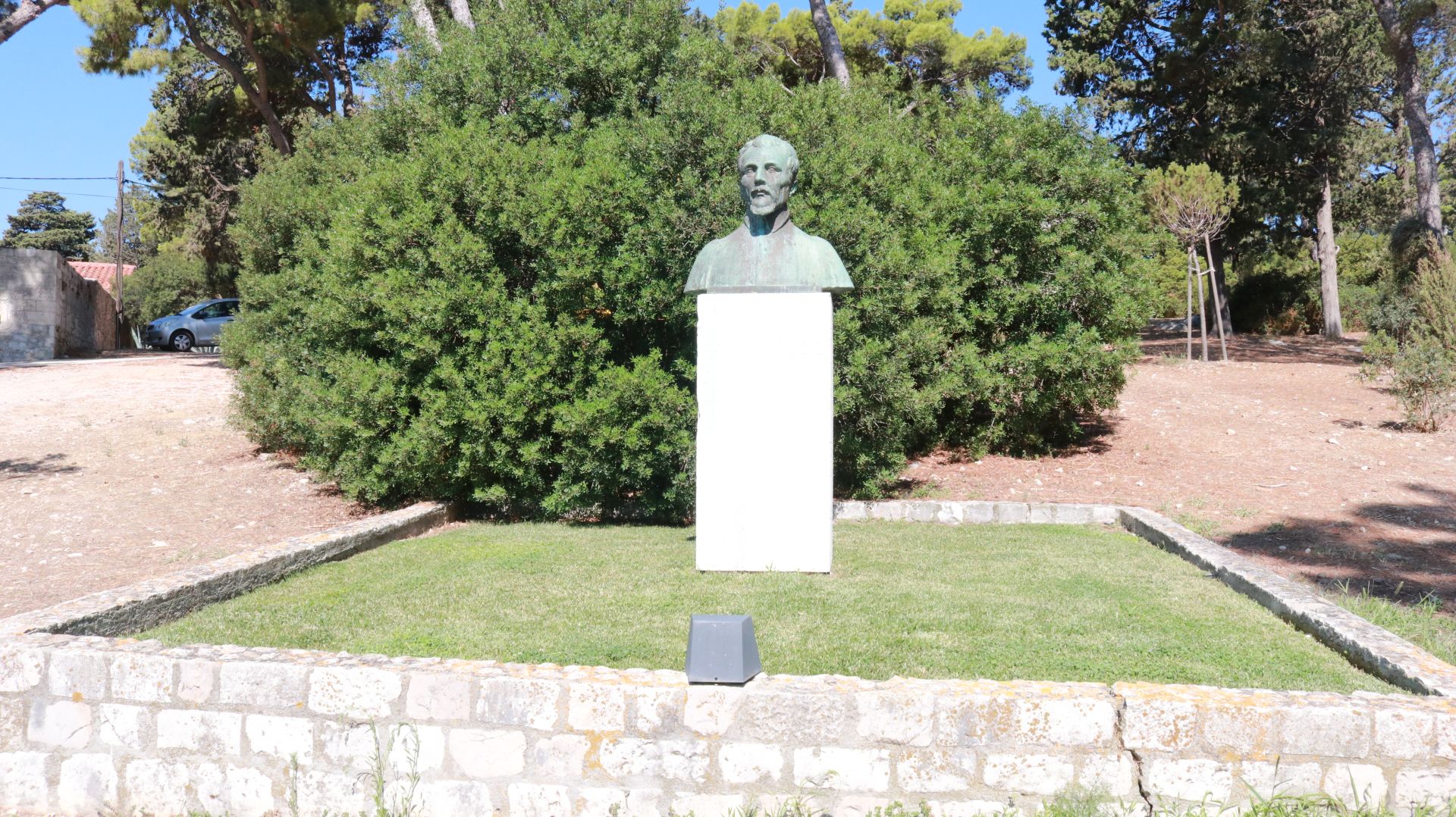Poetry As Preservation of Slavonian Cultural Heritage and Tradition
31st of March 2022 - Meet Željko Čuljak, whose poetry and stories about the beauty of Slavonia and its residents aim to preserve the cultural heritage and tradition of his village Cerić and the whole Slavonian region.
We spoke with Željko in his home in the small village of Cerić, which is located near Vinkovci and has suffered a tragic fate. During the Homeland War, Cerić fell and was destroyed to the ground - residents lost everything and inevitably fled the enemy aggression which destroyed everything in their way. Željko, with his fellow fighters and villagers, stayed behind and helped to protect Nuštar, a nearby village that resisted tireless enemy attacks and led bloody battles that lasted for days. On the 5th of October in 1991, just a few days after surrounding villages fell to the enemy hands (Cerić and Marinci), Croatian defenders resisted enemy attacks and, in the end, managed to protect the village from aggressors. This event is forever inscribed in the history books of the Homeland War as the “Battle of Nuštar”, which was one of the biggest wins of the Croatian army in an effort to protect the country of Croatia from aggressors. Why is this event mentioned? Because its consequences left a big scar on Cerić and its surroundings - destroyed homes, displacement of the residents, destroyed the most recognizable symbol of the village, the church and so much more. The identity of the village was shattered by those buildings and still has an impact on the village's atmosphere today. However, returnees to the village and new residents made it their mission to bring back the old glory of Cerić, promote how people lived before the war, and show that their tradition, cultural heritage, and their lives were not erased on that fateful day in 1991.
Thus, join us in meeting Željko, who is at forefront of the mini “Slavonian revolution” which is propelled by his stories and poetry about the past and present and the future of Slavonia as well.
Željko, can you tell TCN readers a bit about yourself?
My name is Željko Čuljak, a folk poet and a writer, a defender of the Homeland War and a retiree, who in their free time raises pigeons and writes stories about Cerić and Slavonia. I am a father of three children, a grandfather, and a husband. My writing is connected to the exile of our village, ten years of watching my village from the frontlines. To understand my writing and me in general, you need to see where I live.
What is Cerić? If you look at it as an outsider it seems like any ordinary Slavonian small village, so what is so special about it to you?
We live in Slavonia, a rich and “full” region that through time attracted a lot of conquerors and consequently, misfortunes. People who lived here suffered a lot during a few wars that happened in this region and after those casualties, the number of residents rapidly decreased which led to people all over the country migrating to Cerić. In the beginning, a lot of conflicts occurred between immigrants and the old residents, who felt threatened by the newcomers. However, after some time, harmony and love prevailed and connected these different groups. Love won in the end and those newcomers accepted the village's customs and cultural heritage and traditions of this region. In conclusion, calm people live here.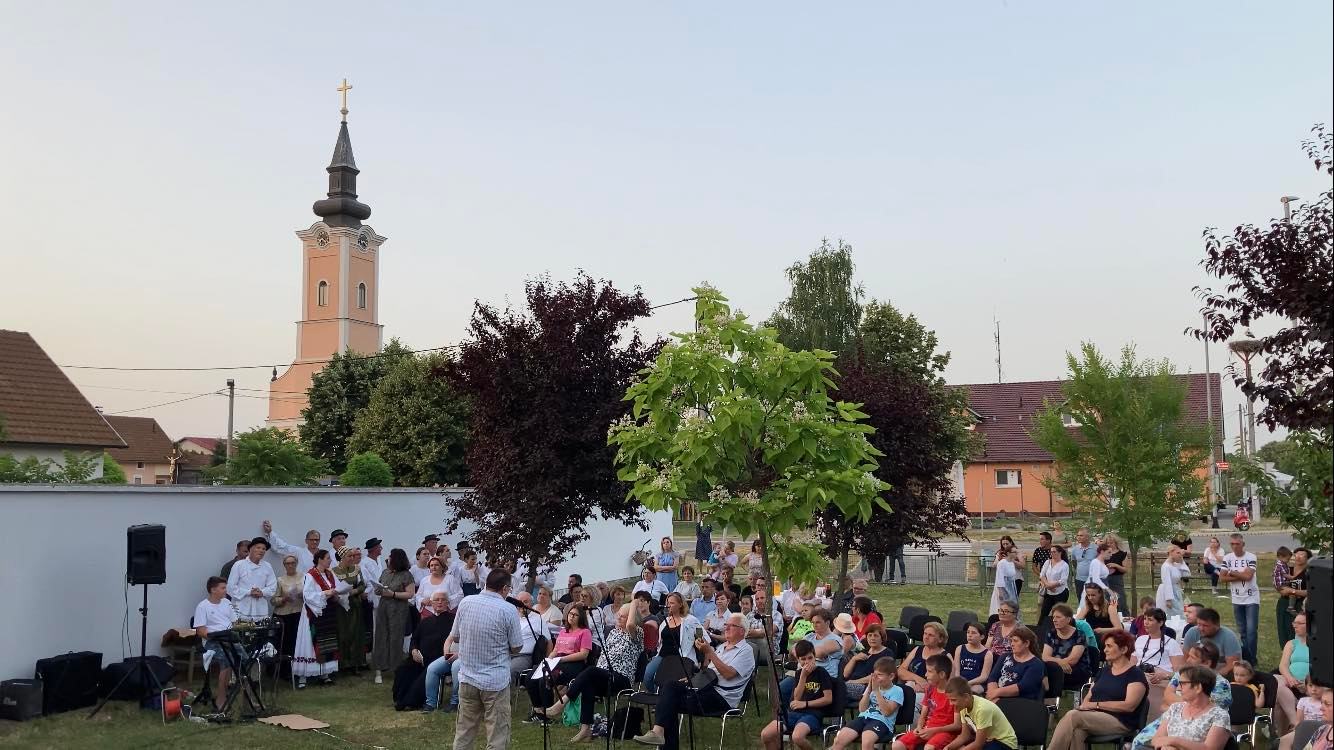
"Evenings with Poetry" in Cerić, (photo credit: Vedran Čuljak)
When did you discover your passion for writing?
I don’t talk much, a lot of the things I prefer keeping to myself and we were taught “if you don’t have anything nice to say, it’s better for you to be quiet.” I endured the war better while I was in it than when I came back to destroyed homes and a neglected village, it fuels the anger in you. That site slowly but surely built up anger and rage in me and I couldn’t express it to others nor me. Then, one time at the mass, I heard a priest talking about anger and saying: “Love your enemies, forgive!” How can I do that?! I realized that I need to forgive myself to let go of that anger. When I’m surrounded by so many good people, how can I be angry?! And those experiences fueled my inspiration for writing. Firstly, I started writing for myself. I write about the beauty and happy adventures of our lives and their residents. I felt sorrowful for not sharing my work with anyone, so I started gifting and selling my work to family and friends. When they liked and praised my work, I felt like I was doing something right. Also, I am part of the Folklore Society of Cerić "Slavko Mađar" and they always need new ideas or “old” ideas I realized that war kind of erased part of our history, people who “disappeared” from this place took the tradition and cultural heritage with them. Today, I’m sort of a keeper of memories in Cerić, one of the people who bring those old stories and memories back to residents and it, unfortunately, seems that people forgot most of them. I try my best to save and preserve that cultural heritage for children of the future. We have a very nice combination of us poets who write and the rest of the village who “absorb” everything we make. We give our poetry soul and actors from Folklore give them life.
Željko, do you think there are enough of these initiatives that have the mission of preserving and promoting Slavonian cultural heritage?
Folklore Societies are keepers of tradition and it’s well represented, not just in our region but throughout all of Croatia. Every village and town have their own Folklore Society. The question is, are people aware of them? Once upon a time, people were actually running away from tradition and it was an embarrassment to even be connected to these groups because everything else foreign was better. Then we realized during War that we miss sitting under the old mulberry tree while the spring sun is shining, harvesting our own crops and so many more things that make this region unique. Simply, all of the residents of Cerić realized that that’s the point - it’s nice to go abroad to a beautiful country or city but in the end, there is no place like home.
Do you have any of your original work published?
I have a collection of poems called Trace of The Soul (Trag Duše) which came out in 2019. It’s mostly poems about the war we experienced, adventures, and traditions Cerić offered and inspired me to write about. I wrote another book of poetry expected to be published near the end of the year, it should’ve been published before but COVID-19 slowed down the process. It’s easy to write for me since there’s a lot of inspiration around me like children going back from school, the boy who’s a head shorter than the girl but still carries her bag, and those kinds of stories make my writing worthwhile. Everything is simple and lively in this village.
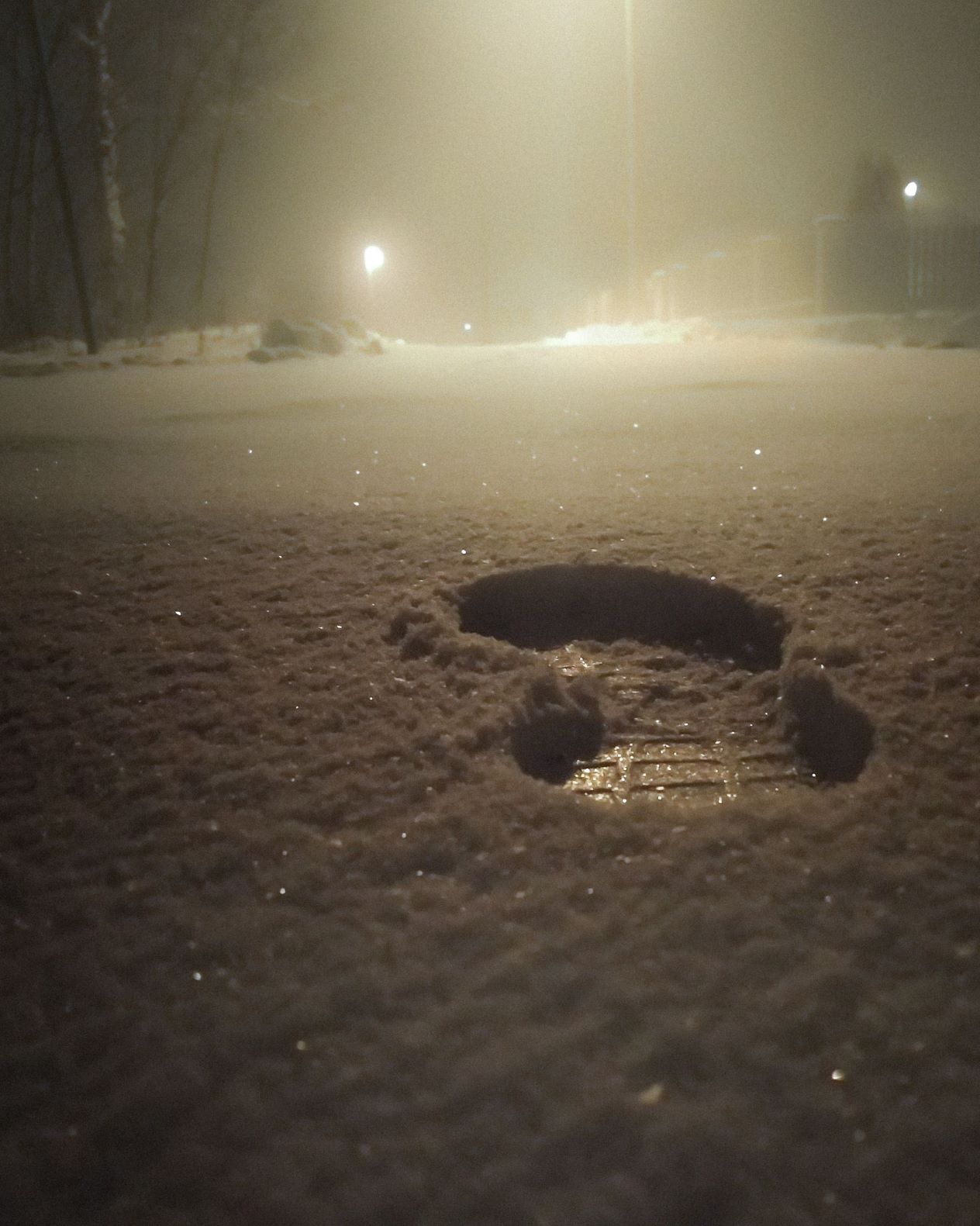
Original cover of "Pattern of the Soul" (Trag duše), Željko's published work, (photo credit: Vedran Čuljak)
Who’s your biggest critic?
My wife is my eternal inspiration to me haha AND my biggest critic of course. Everything that works and everything that doesn’t work she always tells me. She knows how to read my poem better than I! I don’t know how to interpret it when I write it! To me, it’s a blessing and brings me a lot of joy when every poem finds its own role, every person finds themselves in my poem, my story. We are extremely lucky that our whole village participates with us.
Can you tell us the events or manifestations that you organize every year in your village?
We have “Evening of Poetry” which is usually held during summertime at the end of June. It’s part of the celebration of our saint of the village, Ivan (John), or how we say it here, Ivanje. Usually held in the evening, residents gather and light up the torches, we sit on bales of straw in the middle of Cerić and recite our poems and stories. Residents and our guests also participate in the event and it’s such a beautiful celebration of Slavonian cultural heritage and traditions. We have one more event, the “Yearly concert of Folklore Society” which is held around Municipality Day of Nuštar. Local people criticized this manifestation since it was held on 2nd of the October which was the day Cerić fell in the Homeland War. We were accused of celebrating the biggest tragedy this village experienced in its history. What they didn’t understand is that we always celebrate life, coming back to our homes, all of those people who were exiled or have left us for other reasons and we do it with songs, socializing, being happy and that’s the most important part.
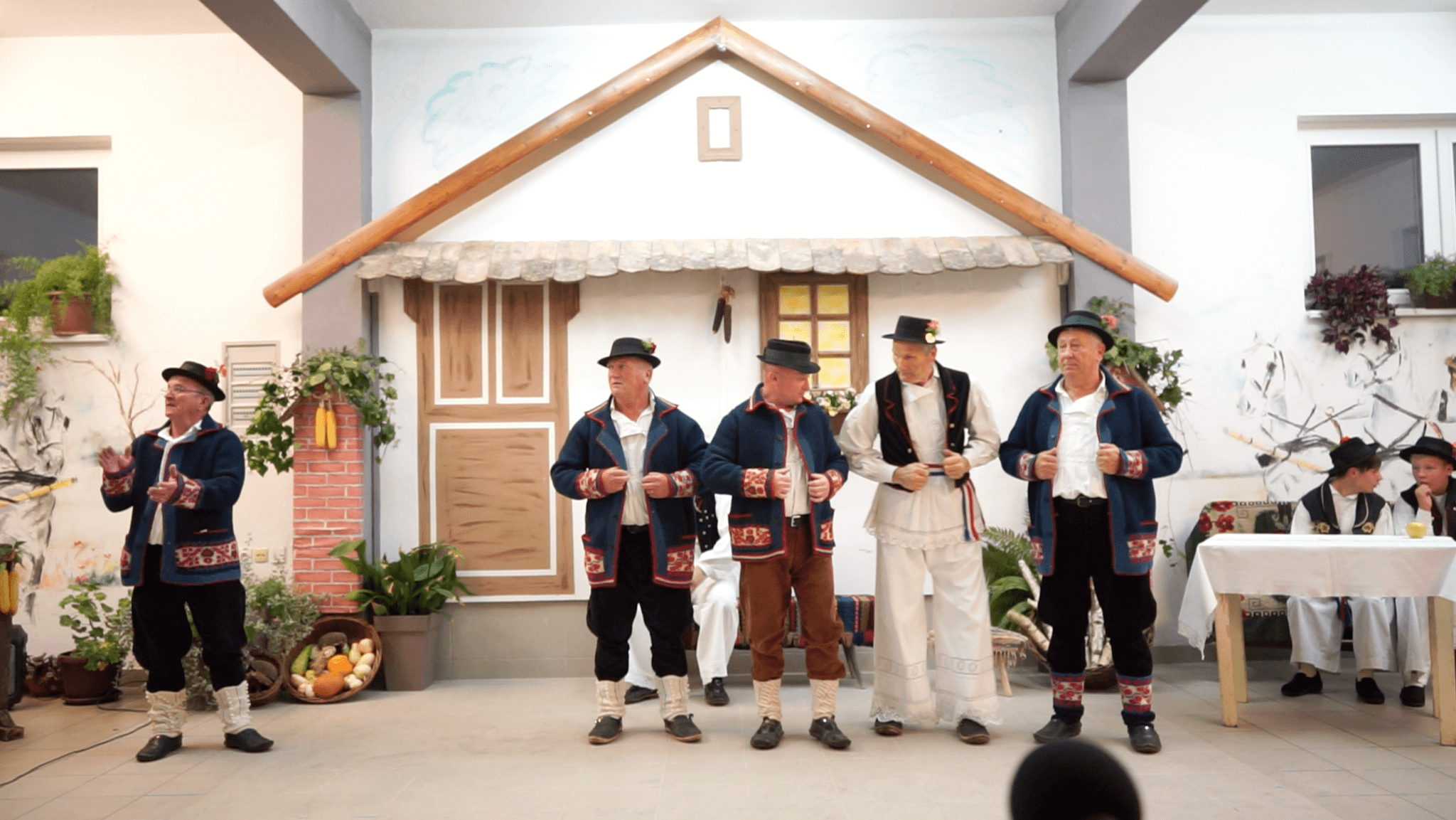
One of the manifestations celebrating the cultural heritage of Cerić and Slavonia, (photo credit: Vedran Čuljak)
As we know, Slavonia lost a lot of its residents in recent years, do you think that factor will affect your manifestations?
I don’t think so. Residents of Cerić notice our work as our guests as well. For example, we had a group of school children coming to our village as part of their trip, it was some kind of Vinkovačke Jeseni program and let’s just say the children weren’t that positive coming here. Why? Because they didn’t know what Cerić is, never heard of it and of course, they’re just not interested in those places, what can Cerić offer to them? However, after we hosted them nicely, organized nice lunch, their teacher, who was in charge, told us that this is the first time in her career that the children didn’t want to go home, they didn’t want to enter the bus and go. I know it’s a small sample but everyone who comes here, goes back home happy and they come back every year. There is still interest and to me, it seems it’s growing in the last few years.
Does that mean that there are successors and willing children to continue doing what you started? Promoting and persevering Slavonian cultural heritage?
Definitely! More and more children realized villages' worth, their traditions, and cultural heritage. Cerić and its residents are unbelievably close and connected, while other villages talk about the alienation of their residents from their heritage, we prosper every year more and more. When a child puts on our traditional folk costume (šokačku nošnju) and when you look at the photos of their ancestors in the same costumes, those children are vivid pictures of their predecessors, great grandmothers, great grandfathers, only the hair and clothes changed. Everything stayed the same. There are successors and always will be. They will never disappear!
Thank you Željko for your time! Can you recite one of your original Slavonian poems for the TCN readers?
From the poem "Slavonia, Mother"
"When I leave my homeland at dawn
I carry in my eyes a memory far from
far from the eye, to the heart, it's also hard
I will return once through tears, I said
.....
We'll meet again under the old oak
when the years close my dreamy eyes
until then I love you and always think of you
in my dream, almost every night I dream about you."
Events celebrating Slavonian cultural heritage mentioned in this interview are held in Cerić on the 24th of June "Evenings with Poetry" and the 2nd of October "Yearly Concert of Folklore Society "Slavko Mađar". If you're ever close and for instance, ever come to "Vinkovačke Jeseni", visit Cerić and their events, Slavonia, as always will welcome you with open arms.
For more, check out Made in Croatia.
Croatian Poet Hanibal Lucić: Renaissance Genius from Hvar
August 14, 2021 - Meet Croatian poet Hanibal Lucić, one of the most respected poets from the country's renaissance period and a noble man from the island of Hvar. This is his story.
The richness of Croatia's heritage is evident not only in its many breathtaking buildings, statues and sights but also in its literature. Sadly, Croatian literature doesn't attract as much global attention as it should when compared to the global impact and various language translations that names such as Shakespeare enjoy. Not to mention antic Greek poets and writers, Italian authors such as Dante, and the list goes on.
Things are changing for iconic writers from Croatian history, such as 20th-century writer Miroslav Krleža as well as many of the modern, still active writers, thanks to the Croatian Literature site powered by the Croatian Ministry of Culture.
Prose writing doesn't have too many challenges for a professional translator when it comes to shifting the story from its original language to another, but you can be sure poetry is another story. If you read an English translation of ''The Flowers of Evil“ by Charles Baudelaire, instead of the original French version, did you really read Baudelaire or an author who made an adaptation of the poem into English in as much as was possible?
Either way, not much work done by Croatian poets is widely translated and known globally, but the Croatian poets themselves are known, and their former residences venues carrying their names and statues dedicated to them are part of the cultural offer Croatian destinations have to offer to their visitors.
In Hvar town, not too far from Veneranda, where the former church and famous former Hvar weather station lies, you can find a bust of a bearded man facing the Adriatic sea, and his eyes look as if they have that filter of lyricism, that poet-style introspect in observing the world. That should come as no surprise as the portrayed citizen of Hvar is non-other than Croatian poet, Hanibal Lucić, a nobleman from Hvar.
The exact date of his birth in 1485 isn't clear, but his date of death, December 14, 1553, is well recorded. The Croatian poet Hanibal Lucić was a renaissance poet as well as a playwright who authored the first secular Croatian drama titled ''Robinja'' (the slave woman). He served the Hvar Municipality back in the time when it was part of the Venetian Republic as a judge and a lawyer. His writings feature the Croatian Čakavski dialect (which distinctly uses the word ča for ''what''), and he wrote love poetry under the heavy influence of the legendary love poet Francesco Petrarca. Lucić was notoriously self-critical, and he even burned his work. Thankfully, his son saved his work and it was published in 1556, after his death.
Hanibal Lucić bust © Nina Lelas
In 2012, the National and University Library in Zagreb (NSK) posted an article in memory of Lucić, stating that he was the greatest writer of Croatian Renaissance poetry.
''We can gather from his literary works that he was exceptionally well-acquainted with classical literature, the Croatian Glagolitic and oral tradition, and the contemporary Italian and Croatian writing of his time. In his poetry, Lucić celebrated his love for women and for female beauty. In their aesthetic quality, Lucić’s poems represent a true masterpiece of Croatian renaissance lyric poetry. He describes beauty and love in the tradition of Petrarch, at the same time drawing on the oral tradition of Croatian love poetry,'' wrote NSK.
His poem „Jur ni Jedna na svit vila“ (No Other Nymph Upon This Earth), one of Lucić's most well-known poems, is an obligatory poem to read in the Croatian education system. You can learn more in this English version of a science paper by Tomislav Bodgan.
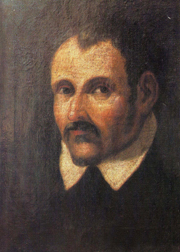
Portrait of Hanibal Lucić © National and University Library in Zagreb (NSK)
On Hvar, his summer residence still stands, and it's open to tourists to visit as its now the headquarters of the Hvar Museum.
''His summer house, the headquarters of the Hvar Museum, is a well-preserved example of the country houses of the Renaissance period, but with clear Gothic influences. Included in the museum is a reception room dedicated to the memory of Hanibal. The museum is also home to the local branch of the Croatian state archives. The opening hours are as follows: 09:00 -13:00 and 17:00 – 23:00 in summer, 10:00 – 12:00 in winter (by appointment),'' wrote Paul Bradbury for Hvar's dedicated Total Croatia page.
So, when in Hvar, do find time to visit the house but also don't forget to visit his bust and seek one of his pick-up lines that can help your banter with that pretty girl on the beach.
Learn more about Hvar on our TC page.
For more about Croatian history, follow TCN's dedicated page.
Total Croatia in Ukrainian: Word of Support by Former Ukrainian Diplomat and Writer Jurij Lisenko
July 12, 2021 - As the Total Croatia site offers translations on all things Croatian in various languages, former diplomat and a famous Ukrainian writer Jurij Lisenko gave his opinion on the Ukrainian translations of the articles. Check out the video, acquired by Ivor Kruljac and edited by Jose Alfonso Cussianovich.
The tourist season is underway, and the goal is to get tourists from all over the world while providing safety in challenging times of corona – both for locals and visitors. As TCN reported, despite the tourist season in 2021 already being 58% better than that of 2020, it also seems that even with predicted Croatian tourism growth for this year, 2019 levels are very far.
With these predictions, Croatian tourists boards should do as much as possible in informing and promoting Croatia to have the best possible outcome. But given that doesn't always work out for the best, TCN is here to help.
Total Croatia: TCN's Multilingual brother
Well, more precisely, not TCN but rather TC or Total Croatia, if you will, the sister site that explains Croatia in detail. TC offers you in-depth articles to explain Croatia from head to toe: What you need to know about Croatia, how to come and travel around the country, detailed views on Croatian destinations, and info on everything you can see and do during your stay.
In addition, articles are translated to various European and world languages!
Word of support from an established Ukrainian writer
One of these languages is Ukrainian and in an effort to see how we did, we reached out to a Ukrainian writer Jurij Lisenko.
„Regarding the text itself, it is really well written. It contains very significant specific business information on various aspects, such as finding apartments or finding jobs for foreigners. At the same time, it is written lively, objective, bit ironic, but with great love for Croatia“, said Lisenko commenting on the Ukrainian translation for the article „Living In Croatia“.
Check out the video to see his verdict for yourselves.
Jurij Lisenko sends a special greeting to Total Croatia News and Total Croatia from Ukraine.
Famous Ukrainian writer helping Croatian writers
In a pool of quality Ukrainian writers, Jurij Lisenko is particularly interesting, not just for his excellent writing, but also as he was a former diplomatic advisor at Ukrainian Embassy in Zagreb.
As Akademija Art wrote, Jurij Lisenko was born on May 9, 1958 in Kyiv. Educated in Slavic languages, he lectured the Ukrainian language as well Serbian-Croatian in the Journalist faculty in Kyiv from 1980 to 1997. He also published over 20 scientific papers on philology and is a known poet publishing under the name of Jurko Pozajak. In 1998 he moved to diplomacy and worked for the Ukrainian Embassy in two terms (1998-2002 and 2013-2017), and also in Embassy in Belgrade, Serbia, from 2004 to 2008. He was also a speechwriter for Ukrainian president Viktor Juščenko and continued to work for Ukrainian's Ministry of Foreign Affairs since 2017.
Lisenko captured the attention of the Croatian public when along with his daughter Daria, he made new Croatian words, and the two co-authored a book of poetry for kids „Ide Svašta!“ (Everything coming).
As Večernji List reported back in 2016, their book was published back in 2002, and an expanded edition was printed in 2014.
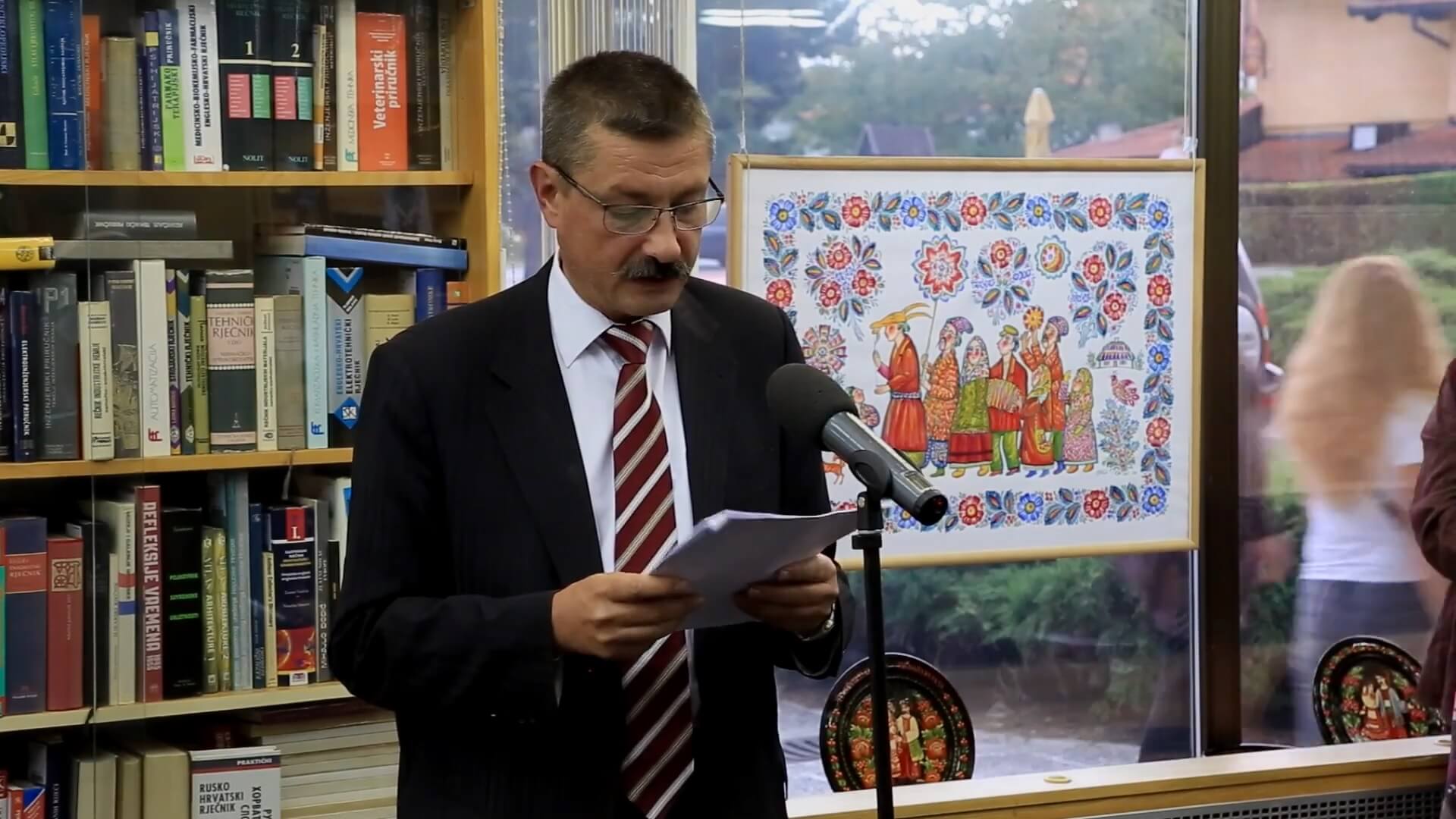
Jurij Lisenko reading his poetry at the exhibition opening of Ukrainian folklore "Petrikivski Rospis" in Samobor screenshot / Gradska knjižnica Samobor
Apart from that, the Lisenko family was very active and beloved on the Croatian poetry scene, and apart from presenting Ukrainian culture in Croatia, Jurij also introduced Croatian writers to Ukrainians.
The best instance of that is the Ukrainian translation of Croatian slam poet and writer Žarko Jovanovski and his short story collection „Tales of Lenin and Stalin“.
In addition, the good cooperation of the Ukrainian and Croatian writers is evident in an international literary magazine, Alternator, published by Sisak's Association For Alternative Culture, where Lisenko is a member of the editorial staff.
And the relevance of Lisenko as a partner for promoting Croatian writers in Ukraine was perhaps best described by the head of Edicije Božičević publishing house, Josip Ivanović.
„For a number of years, I knew a poet, diplomat, and genius Jurij Lisenko who I deeply respect. He is known in Ukraine more or less as an Avant Gard poet. And he published his book a long time ago. We walked around Lviv, and when there is a Lviv Book Fair, there are quite a lot of people and the atmosphere is as on a festival. Students approached him asking him to sign a book that he, as a poet, published 20 or 30 years ago. I never saw anything like that in Zagreb“, recalled Ivanović for Podcast Sekstant.
This shows not only that Ukrainians in general respect literature more than Croatians, but it is evident Lisenko is quite the rock star on the scene.
„I was very happy to see on Total Croatia a text on possibilities of foreigners in Croatia and that it was translated to 16 or 15 languages, including Ukrainian. I was very pleased with that. This means that connections between Ukraine and Croatia are significantly stronger. Indeed, in the last 10-15 years, Croatia became a favorite holiday spot for Ukrainians“, commented Lisenko.
Ukraine and Croatia – similar and friendly
With some differences between the Soviet Union and Yugoslavian communist practices, both Croatia and Ukraine share the same history of denied independence under a multi-national regime.
Đuro vidmarović, Croatian writer and former diplomat, told Laudato TV how the first Croatian president Franjo Tuđman appointed him as a Croatian Ambassador to Ukraine and how he was afraid as he wasn't sure what will await him there. But in the end, Ukraine for Vidmarović became a great topic and a happy period of his life. 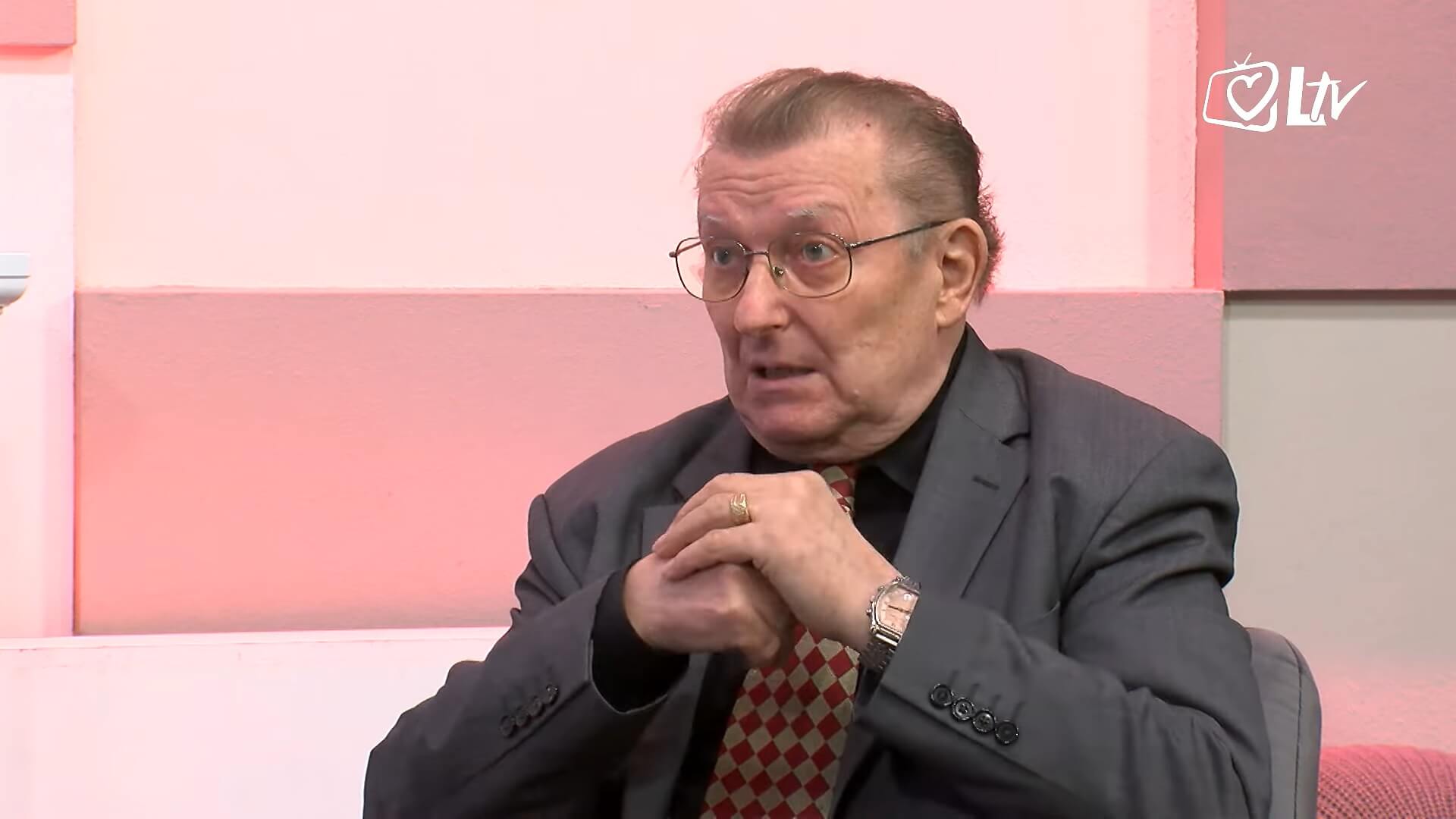
Former Croatian ambassador in Ukraine and writer Đuro Vidmarović, screenshot / LaudatoTV
„After I very quickly learned Ukrainian, a big area of Ukrainian culture and heritage opened up to me“, said Vidmarović adding that he met a lot of good colleagues there, particularly writers. As it was his mission to present Croatia, he also learned a lot and remained fascinated with the country of his mission.
„Ukraine is big, huge, contradictory, magical, unique, with a culture that makes it impossible for someone to stay indifferent. You come to Kyiv, and you see the Saint Sophia Cathedral from the 12th century with beautiful frescoes and architecture. My god, someone had to build it, had a sense for it. It was a civilization stronger from the majority of European countries at the time“, said Vidmarović for Laudato TV mesmerized with Ukraine he researches even to this day.
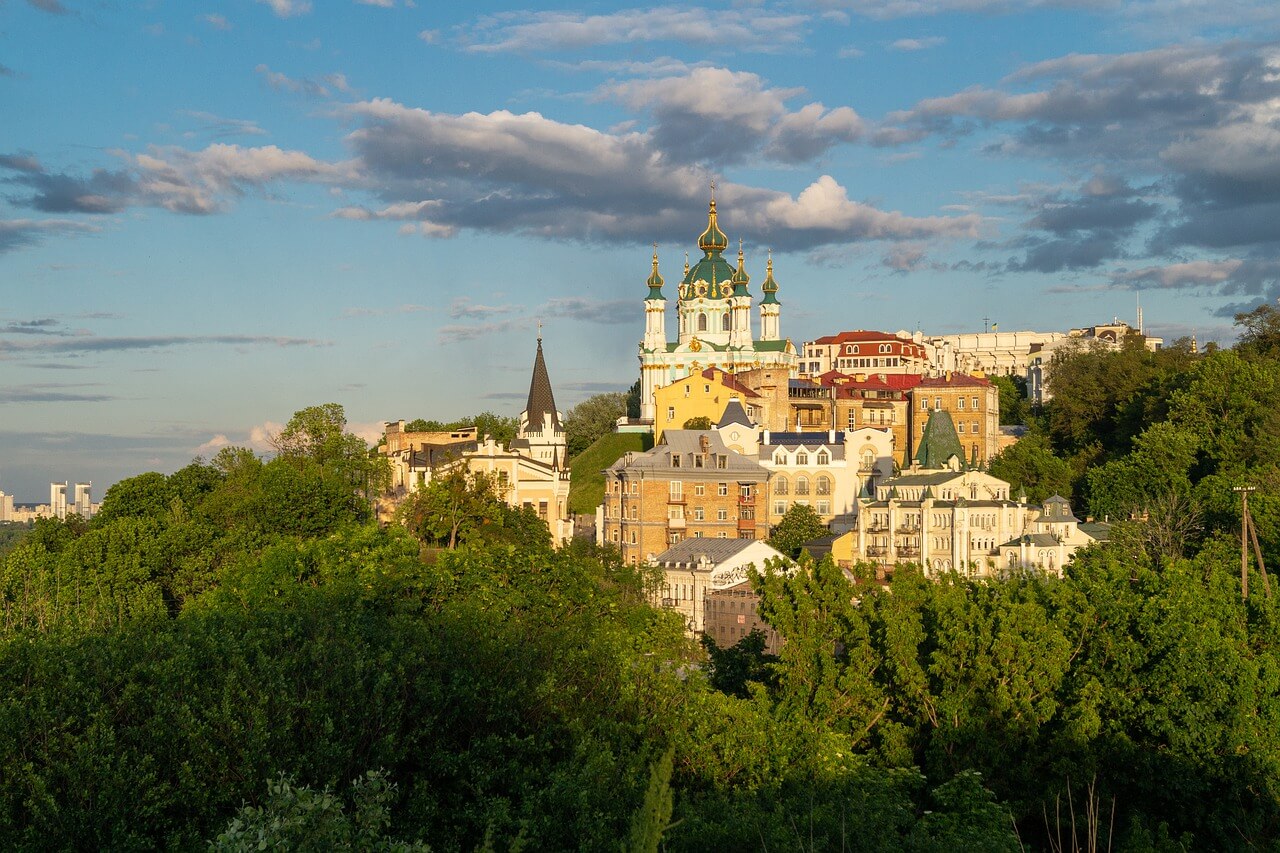
Breath-taking view of Kyiv © Pixabay
As Lisenko acknowledged, Croatia is also very famous in Ukraine too.
„Ukrainians discovered Croatia for themselves. Croatia is a beautiful country. You know that for yourselves. But, for Ukrainians, it is particularly pleasant in Croatia that they don't feel like strangers. But, for Ukrainians is a particular joy that languages are similar and Ukrainians, after several days, start to orient themselves in the language, to understand a bit, and can communicate with Croatians in cafes, restaurants, shops, streets, anywhere“, explained Lisenko for TCN.
He added that a lot of Ukrainians also come to Croatia searching for a job. While this may not be the best thing from the perspective of the Ukrainian economy (same as Croatians leaving Croatia isn't great for Croatian economic interests), Lisenko recognizes that the trend „also brings our two nations close“.
Discover Croatia in your native language
Apart from the article Lisenko commented on, Життя в Хорватії 2021: Витрати, дозволи, стиль життя та зустрічі з людьми, Ukrainians can also follow latest reports on COVID-19 in Croatia as well as 10 речей, які роблять Хорватію найкращою країною (or for English audience, 10 Things Croatia Does Better than Anywhere Else).
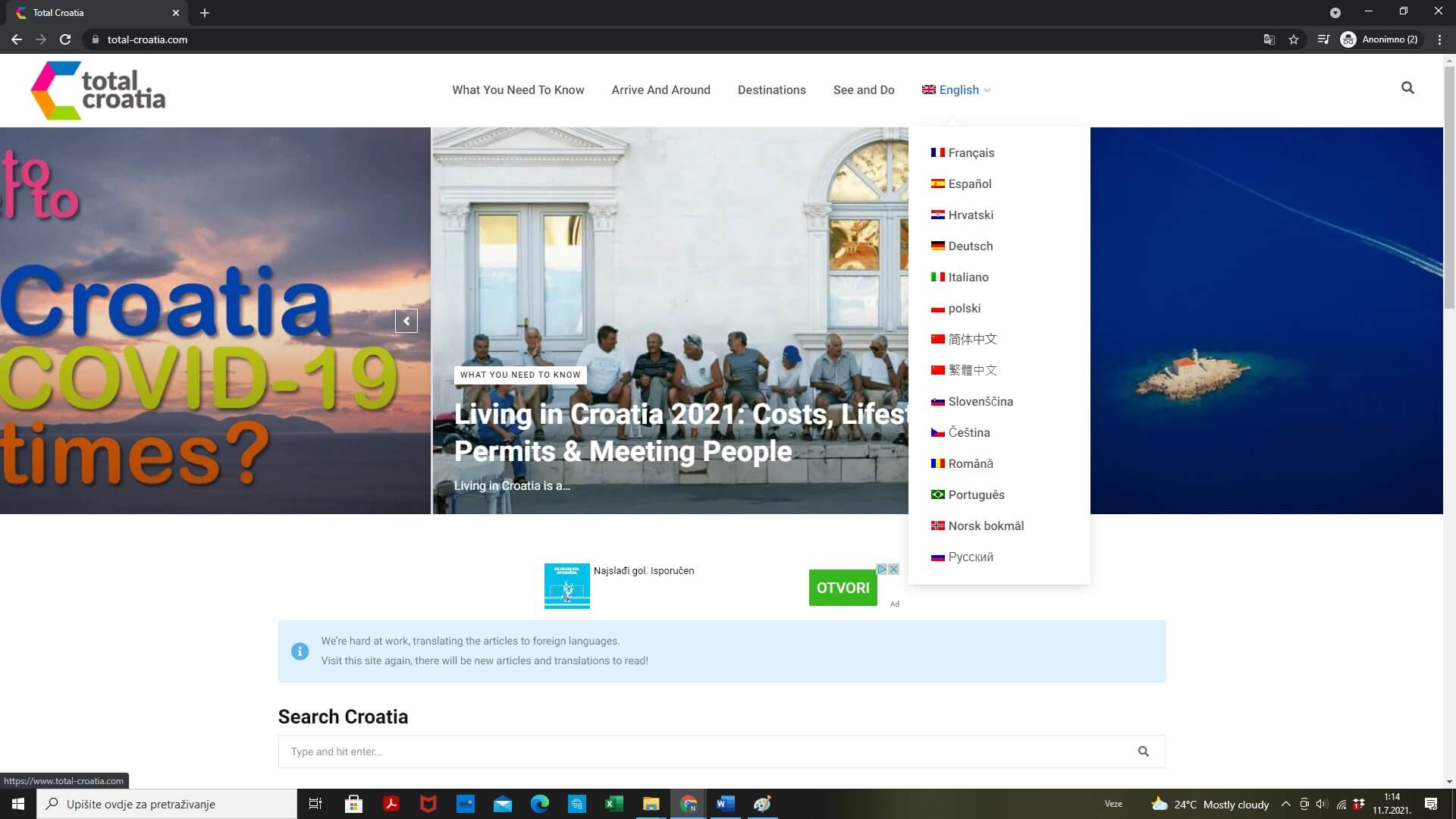
View of Total Croatia site and languages
So far, only these three articles are available in Ukrainian, but no doubt the future will bring more to make Croatia more accessible to beloved Ukrainian visitors.
Currently, TC counts 15 languages with the most translated content from English: Croatian, French, Spanish, German, Italian, Polish, Chinese (both traditional „zh-Hant“ and simplified "zh-Hans"), Slovenian, Czech, Romanian, Portuguese (Brazilian), Norwegian (Bokmål), and Russian.
If you want to learn more about diplomatic relations of Croatia, and everything regarding diplomacy and Croatia, check out TCN's series "Friends of Croatia" by Ivor Kruljac.
For more about Ukraine in Croatia, follow TCN's dedicated page.
Professor Slavko Krajcar Death: A Look at the Life of Fantastic FER Professor
June 24, 2021 - Following the professor Slavko Krajcar Death on June 18, take a look at the life of an established educator and scientist whose expertise made a significant contribution to Croatian politics in the energy sector.
„The influence of a teacher can never be erased“, or as an American historian Henry Brook Adams put it, „Teachers affect eternity; no one can tell where their influence stops“- these two are just some of the inspirational quotes about teachers you can find with a little assistance from Google.
Students at the Faculty of Electrical Engineering and Computing (FER) at the University of Zagreb are recognized in Croatia for their innovations. At the end of the day, they owe their excellence to the professors that educated them.
One of such professors was Dr. Slavko Krajcar that sadly, as FER official website reported, passed away on June 18, last week.
"Professor, Dr. Slavko Kranjcar made a significant contribution to the Faculty of Electrical Engineering and Computing as he was a dean of the Faculty from 1998-2002, after which he was the head of the department for high voltage and energetics from 2002-2006. He will remain in permanent memory as a respected scientist, expert, and a colleague“, said FER in an official release.
Kranjcar was also the member and the president of the Managing council at Ruđer Bošković Institute (IRB) that also expressed its condolences.
Born on January 14, 1951, Slavko Krajcar enrolled to study in FER in 1969, followed by graduating from Technical High School in Pula. He majored in FER in 1980 and got his Ph.D. in 1988. His scientific and lecture career started in 1974 when he was an assistant on a manufacturing electric energy course. From there on, he mentored various students on different levels, ten of which earned Ph.D. statuses under his guidance.
Kranjcar was active in the media, giving interviews and writing op-pieces on education issues, specifically the education of engineers in the 21st century.
„Krajcar participated on many domestic projects regarding science or economy as well on international scientific and professional projects. Counting just after the year 2000, he participated in over fifty projects, 36 of which he led. He was one of the leading figures in making Croatian Energetic Strategy (which the parliament accepted in 2010) and the Energetic Efficiency Strategy (2008) as well as executive plans on new strategies (2008-2020)“, recalled FER.
They added Fer rewarded Krajcar in 2002 when he received Josip Lončar's golden plaque for his dedicated scientific and educational work. He also received special recognition for developing SRCE- The Computer Centre of the University of Zagreb in 2011, followed by the Ho CIRED award for contribution in developing the field of electro distribution in Croatia. He also received HRO CIGRE recognition in 2018 for the overall contribution to the electro energetic activities in the Republic of Croatia and the Nikola Tesla Award in 2020 for the contribution to science, education, and profession in the field of electrical engineering and computer sciences and application of those technologies.
Believe it or not, Krajcar even made time to contribute to art and culture as well. He published two books of poetry, edited four books regarding cultural issues, and was the president of the Association for Čakavski dialect (distinct for the use of Ča as a word for what and conversated on coastal Croatia).
Learn more about Croatian inventions & discoveries: from Tesla to Rimac on our TC page.
For more about science in Croatia, follow TCN's dedicated page.
Croatian Poet Criticises Petition Against Culture Ministry's Tender for Support
May the 14th, 2021 - As the new public tender by the Croatian Ministry of Culture and Media was met with the outrage by writers community, a Croatian poet ranting about writers ranting about the culture ministry is quite the turn of events. TCN reporter and slam poet Ivor Kruljac approves but also debates parts of the petition launched against the aforementioned ministry.
The ever-unfortunate literary scene in Croatia, which is sadly not represented as it should be neither in Croatia nor abroad, took heavy blows as a result of the coronavirus pandemic - much like the majority of other sectors. Popular literary events such as Interliber, and many more fairs ended up being cancelled, the blow to this specific branch of cultural industry that generally receives poor investments and poor profits thus became even more challenging.
To jump to the rescue, The Croatian Ministry of Culture and Media issued a public tender for both writers and translators. As Jutarnji list reported, the tender for the provision of financial aid to authors and translators for the best books and translations in 2019/2020 introduced a little novelty along with it.
''With the commissional value of the books, which in previous editions [of such tenders] was the only criterium of assigning financial support, this new tender also has a numerical valuing of literal works“, reported Jutarnji.
This numerical valuing is assessed by the number of awards, the level of participation in literal manifestations and festivals, and critical responses.
''Forty points goes to the winners of the awards: Janko Polić Kamov, Fric, Ksaver Šandor Gjalski, Edo Budiša, Vladimir Nazor, Kvirin, Judita etc. While rewards such as Post Scriptum, going to Fran Galović, Sfera, Tea Rimay Benčić etc, are worth only half of those points. Fifteen points can be received by participating in some festivals and manifestations, while the lower rank of such events is worth ten points. Ten points are also added for reviews in certain media while for others (this sometimes includes expert magazines), the critical review is worth only seven or four points,'' wrote Jutarnji List.
The literary community rebelled, and they started a petition called "The Right to Quality" against these propositions, demanding for the tender to be cancelled, which is supported at the time of writing this article with 233 signatures of Croatian writers and other concerned citizens.
''Public funding support for the best work has significant importance for the number of authors, which is why the authors themselves fought for the existence of this type of support with the initiative ''The Right to a Profession'', reads the text of the petition. The petition also welcomed the description of the criteria to improve transparency but determines that the quantification of literary value, which is a qualitative category in itself, ''disables the authors of a high aesthetic value to get the support their work truly deserves.''
Additionally, playwriters aren't even mentioned in this tender (despite grading rewards which are reserved for playwrites, poets, and essay writers, who are also in a bad position), and the winners of some of these awards will be known only after the ministry's tender closes.
The Culture Ministry could make many, many improvements, but, having the (mis)fortune of being present on the writing and more particularly, the poetry scene for the last six years (publishing and performing at various events, publishing short stories, and for better or worse, even being covered by the media for my work) I can't say, as a Croatian poet, that the arguments are really on the side of the writer's community either.
Here are several arguments regarding to petition (in bold), as well as counter-arguments (not in bold) from the most annoying Croatian poet in the country. I have no doubt my other colleagues will most likely hate me for it, but you, the reader, are free decide what seems to have more sense. Given the fact that Croatia is a democracy, the pluralism of opinions and civilised public debate is always welcome. Despite the fact that I will not sign the petition, you should sign it yourself if you feel it to be the right thing.

pixabay
Assigning the funds by the number of sold copies of books borrowed in libraries is problematic as it's not showing the work's actual quality. Readership is affected by various factors, which don't always come because of a book's quality, but from the previous visibility of the author and the budget the publisher has.
Well, how exactly do we determine the value of literary work? I'm no literature academic, and literary academics don't really communicate these ''legitimate criteria that makes a good book'' all that well. Additionally, these books which are labelled as being good, are so boring to the average reader, and then the reader often gets insulted by ''the intellectuals'' for reading such garbage. When you look at other arts, such as music, you can see that music academics favour some music over other types but then again, some music, known as pop, is made for common people and the artists don't focus on achieving some melodic masterpiece but rather to entertain their audience or send a brief message.
Why do writers who do the same get so ridiculed by academic circles?
Why are they ignored by Croatian publishers? Why do writers then insult the readers, making literature more repulsive to the audience, and then get shocked when there isn't a lot of reading done and consequently not much money to be had from the book business? This also makes the Croatian literary offer very poor, and often its style and topics end up being very similar as a result of this unexplained criteria. In return, there's very little Croatian crime fiction, SF, fantasy, love stories, and other genres, and the readers turn to foreign writers in search of such stories (Jo Nesbo, Stephanie Meyer, J.K Rowling. Lois McMaster Bujold and many, many more). Such writing makes them popular and also visible. That's the answer as to whose work gets most bought and borrowed in Croatia, give them the cash!
Poets are at a disadvantage from the very beginning. There are far fewer rewards for poetry than there are for prose, which means the poets can do nothing else but achieve fewer points. There's also less poetry writing in general, which means a lower amount of points coming from critical reviews. Child authors, essay writers, and comic book artists are in a worse position than poets as well.
The above gets right to the heart of the point from the perspective of a Croatian poet. But, why is it like that, exactly? Before the coronavirus pandemic took the world by storm, there were so many poetry events filled with poets performing and the audience coming to watch them perform. Be it slam poetry, open mics, or some other poetry events, be it in the libraries, bars, or clubs, it was apparent that Croatia doesn't lack poets, nor does it lack an audience for it. These events were in the majority and were always very open to newcomers.
Social media is also filled with people, either quoting their favourite poets or posting their own, personal poetry. So, why are there no more rewards and why is there not more extensive interest from the publishers (with some honorable exceptions) to invest in poetry and keep up with the trends? Culture journalists working for various media outlets should focus more on poetry as well, and coming from TCN's perspective, poetry articles really do attract an audience, as we saw on March the 21st (assuming that reporting on poetry, an important artistic and historical heritage of the linguistic form, isn't rewarding enough in itself).
Evaluating work by the number of reviews is problematic as books that are more visible, in principle, receive more reviews. The authors whose books are published by smaller editors, who have fewer resources to invest in their promotion, are in a less favourable position. In addition, evaluating the number of reviews where three negatives are worth more than two positives is also illogical in order to evaluate the quality of a piece of work.
On top of that still, the amount of points based on the media site on which the critic is published seems to be very random. The result is the unusual circumstance in which, if the same critic writes two reviews of two different books and publishes them on two different sites, depending on where the critic published the review, one writer will receive 10 points, and the other one four even if the first review was positive, and the other one - negative.
Again, the beauty is in the eye of the beholder, and there's no empirical way to determine which book is a good book and which isn't. If there were such a righteous empirical way of determining the quality of a book, we wouldn't have the difference between positive and negative reviews. Bad would always be bad, and good would always be good, and there wouldn't be any debates.
Take a look at the empirical field of physics and the definition of friction; ''Friction is a force between two surfaces that are sliding, or trying to slide, across each other“. This definition will always be the correct definition regardless of culture, personal preferences etc. Furthermore, positive reviews, even if done correctly by the rules of the still ''unclear criteria of literature scholars“, that wouldn't be set in stone.
When the poetry volume ''The Flowers of Evil“ by Charles Baudelaire was originally published back in 1857, the academics of the time condemned it as immoral and wrong, and of a poor quality, but today it is celebrated by the successors of that same academia, as one of the best poetry books ever. So, no writer should even care if the reviews are good or bad in terms of quality. That being said, reviews will raise a publication's visibility, attract readership, and inspire critics to write more reviews (combined with the PR done by the publisher). All of this shows the writer's ability to spark a reaction with their work. As such, whether a review is good or bad is irrelevant, but reviews do show the impact and public importance of the book, and therefore it seems to be quite the right direction to go in assessing books by the ministry.
That being said, the tender benefiting the publishing of one review in one media outlet over another is problematic if it doesn't better elaborate why some media outlets are favoured over others in the tender.
Furthermore, big publishers publish more books in larger quantities, and invest more in their promotion, and they already have a name that attracts the press. That is absolutely true. But, today, with the development of social media (which allows promotion without high expenses), and while journalists strive to discover new things, new names, new approaches - small publishers have never before been in a better position to push themselves and the writers they represent out into the public arena and develop and expand to the level of ''big players“. The only question is - do they have the will to do it?
It's not adequate that the esthetical value of a book is evaluated by attending events and manifestations. Festivals more often call upon already established authors who then have an unfair advantage. Additionally, every organiser mostly invites his own authors who again have an advantage over the others. The tender doesn't value international festivals, which causes a paradoxical situation in which the promotion in the organisation of the publisher is evaluated, but it's not evaluated when the promotion happens during an established international festival.
The term ''the presenting of the book“ is problematic for multiple reasons. First and foremost, the majority of these festivals don't present the book (and its a problem to prove that by participating in these festivals, the book was actually presented). Last, but not least – this is discriminatory towards authors of a weaker state of health, who are older (with the risk of the novel coronavirus still large) or busy with family and work obligations and are unable to travel.
Festival organisers do discriminate against writers, but whose fault is that exactly? Are these festivals organised by the Republic of Croatia, by the Ministry of Culture? If they are, then it's problematic, but if these festivals aren't organised by the ministry, then this whole petition is barking up the wrong tree. If the festival organisers aren't willing to be more fair and open to new names, then we, the writers, need to show solidarity with our colleagues and negotiate with festival organisers to invite our colleagues who are less presented to participate. If you're a writer/publisher seriously concerned with this issue, but you're among the lucky ones who get invited, use your position to help others out a little.
On the other hand, it's too bad international festivals aren't valued in the tender, and the ministry should work more in helping Croatian writers become more visible on the international scene. Regarding ''vulnerable writers, the old, the sick, and those too pre-occupied to attend'', they should be presented by their publishers, and an additional problem is that often the expenses of travelling to festivals aren't covered for the writer, and their participation costs money.
Awards such as the VBZ award, the Dragutin Tadijanović award assigned by (HAZU) etc aren't mentioned in the tender. Relevant international awards Croatian authors frequently are awarded, such as the Bridges of Struga (Macedonian award), the European Union Literature Award, the European Poet of Freedom, etc, are also ignored.
Every single award, be it Croatian, European or international, should be valued in the tender, but VBZ really shouldn't be. For those who don't know, the VBZ award is the annual award for the best-unpublished novel, and the winner sees their manuscript published, and there is a financial 100,000 kuna prize that goes with it too. With a huge monetary prize and the chance to have that piece of work published, why would VBZ be part of a tender whose goal is to financially help those writers who have run out of money?
The bigger problem is the question of how fair are these awards in the first place. Are they transparent? Are there no biases from the judges appointing these awards? Interestingly enough, there used to be an award called ''Kiklop'', which was given to the most purchased book in Croatia, but was cancelled in 2009 because the winning book by Nives Celzijus (about what's it like to be the wife of a Dinamo footballer) was considered by writing community to ''not be intellectual enough''. When in reality, for a book that can appeal so much to the Croatian readership, in a country that doesn't read much, such rewards should still be respected.
The final item of the tender that tries to consider the books that went unnoticed isn't going to accomplish too much. From the whole tender, it's visible that the emphasis is being placed on the work that received the most media attention and follows the old principle - The more attention something gets, even if it isn't good attention - the better.
Again, books should be visible to the public, and visibility should be awarded. The majority of publishers seem to see the distribution of a writer's work as their only job, and then they're surprised when despite distribution, the books just sit there not being snapped up by eager readers. Knock on doors, contact people, contact the press, everyone. Prepare a decent press release. Scream from the rooftops that you published a book from the top of your lungs and afford your writer the attention their work deserves. With the aforementioned development of social media, there's truly no excuse to be lagging in that respect today. Then, you'll get the media attention, and half of this tender would not be problematic at all. The problem is the policy of publisher's work and not the criteria by the ministry for this particular item.
Overall, the Ministry isn't without sin in this saga, but the Croatian writing community (particularly publishers, and event organisers) also needs to act differently to benefit the writers themselves, especially the new generations (and poets, stop forgetting the poets!).
Poets and writers deal with language, and you can learn more about the ins and outs of the Croatian language on our TC page.
For more about culture in Croatia, follow TCN's dedicated page.


